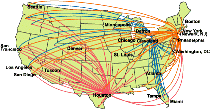United States Department of Transportation

United States Department of Transportation: Publications
Date of this Version
2002
Abstract
Human error is a major cause of incidents in the offshore industry. For example, in the Gulf of Mexico region in 1998, 38% of all incidents were attributed to human error with an additional 9% of incidents resulting from slips, trips, and falls (MMS 2000-021, OCS Report). Human Factors, when integrated during the design of a new offshore facility, can reduce the potential for human error and the occurrence of unfortunate incidents.
Quite often the implementation of Human Factors (HF) during design is disregarded because of the notion that it will add unacceptable costs. Review of the cost/benefit data contained in this paper proves that notion to be untrue. Although cost/benefit is important, it was not the primary focus of this Working Group. This paper’s focus is to develop a means or a strategy to effectively integrate the application of HF design principles into all phases of a new capital design project.
This Working Group’s objective during the Second International Workshop on Human Factors in Offshore Operations was to generate discussion concerning HF integration strategies and to focus on specific implementation issues that have been shown to be successful. These include but are not limited to:
· The factors critical to the success of HF integration
· What HF activities should be conducted
· At what stage during the various design phases should HF activities take place
· HF strategies, how to decide what level of human factors engineering is required
· The qualifications and responsibilities of those executing HF activities


Comments
Proceedings of the 2nd International Workshop On Human Factors In Offshore Operations '02. Huston, Texas, April 8-10, 2002.